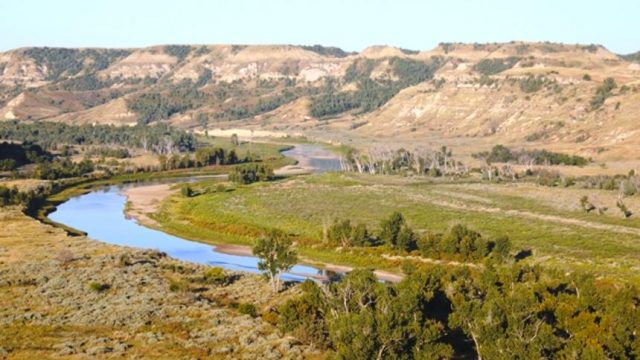John Andrist: The Feds Shouldn’t Own Lands Without Purpose

????????????????????????????????????
Reflecting this week on federal land ownership in this country, I googled for information.
And I learned quite a bit, mostly from an essay on the Tenth Amendment by a constitutional scholar.
What started me on this journey was curiosity as to who owns that brush country which so frequently is catching fire and consuming hundreds or thousands of homes every summer, and which keeps our forestry fire fighters working so hard in the dry summer months.
And yes, it appears mostly to be primarily federal land.
The feds own from 30 percent to 88 percent of the Rocky Mountain states. Much of it is in the mountains themselves and in national parks,which seems to be quite appropriate.
But they also own vast tracts of mostly unproductive and poorly managed brush country and grasslands, including a pretty good chunk of southwestern North Dakota.
[mks_pullquote align=”right” width=”300″ size=”24″ bg_color=”#ffffff” txt_color=”#000000″]…if they just sold off the usable acres for which they have no purpose we could retire a significant part of the national debt.[/mks_pullquote]
Through the Louisiana purchase they owned pretty much all land west of the Mississippi.
But quite wisely they began to sell it or give it away to homesteaders during the great immigration period.
It rarely happens anymore, but if they just sold off the usable acres for which they have no purpose we could retire a significant part of the national debt.
Mind you, they could retain easement rights to regulate how the land is used, but the Tenth Amendment seems to suggest they have no right to retain land for which they have no purpose.
Might they someday need it? They still have the ability to acquire land for real needs like air bases, highways and airports, and for reservoirs of water created by big dams. They even have the power of eminent domain to acquire new acreage for necessary purposes, if they must.
I suspect the only reason they quit selling what they don’t need is the mind-set of environmental activists.
But the Tenth Amendment to the constitutional — that’s the one which says most powers belong to the states, not the federal government — seems to suggest owning all that land within the borders of states for no good need or purpose is a violation of its intent.
Some of it might even provide a place for refugees to live off the land, as the Homesteaders learned to do.
What entitlement?
I’ve also been thinking a lot lately about entitlements, because they seem to be creeping more and more into our political debate.
The U.S. constitution speaks nothing about taxing simply to transfer the money from one to another. It obviously wasn’t conceived.
Few of us would not want to provide special entitlements for children — like basic education, for instance, and adequate food, clothing and shelter.
But the first major entitlement for everyone, I believe, was Social Security. That was sold to us as an insurance or retirement program, which it never really was.
Social Security was simply a tax on working people to provide benefits to older retired people. The money some of us envision has been set aside from our paychecks has been given to somebody else.
Most of us have been satisfied with the program. A whole new set of entitlements has come with the rise of social services. We do have a compassionate nature.
But we thought of them as assistance, rather than entitlements — something we were somehow owed.
Entitlement thinking moved one more step in the field of medicine. More and more we have been conditioned to think that “life, liberty, and pursuit of happiness” means health care for everyone.
Bernie, with the me-tooism of Hillary, now thinks a college education is an entitlement. What else will come next? Clothing? Housing? Computers? Cell phones?
We’re also inclined to make entitlements out of the gifts we receive in our personal lives. A good many grown, independent adults really believe they are entitled to what their parents and other relatives have acquired, after they die.
The gifts we get at Christmas time tend to become expectations next year. And after a few more years they move from expectations to debt payments. They owe it to us.
What really are we entitled to? It’s a good question for all of us to ask ourselves, because our answers aggregately become what our taxation and governance is all about.




